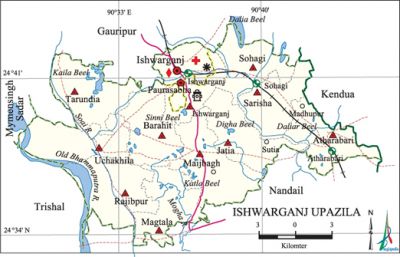Ishwarganj Upazila
Ishwarganj Upazila (mymensingh district) area 280.43 sq km, located in between 24°33' and 24°44' north latitudes and in between 90°28' and 90°46' east longitudes. It is bounded by gauripur upazila on the north, nandail upazila on the south, kendua upazila on the east, mymensingh sadar and trishal upazilas on the west.
Population Total 376348; male 187217, female 189131; Muslim 364229, Hindu 12043, Christian 10 and others 66.
Water bodies Main rivers: old brahmaputra, Mogha, Soai and Kanchamatia; Kaila, Sinni, Digha, Katla, Dalia and Daliar beels are notable.
Administration Ishwarganj Thana was formed in 1936 and it was turned into an upazila in 1983.'
| Upazila | ||||||||
| Municipality | Union | Mouza | Village | Population | Density (per sq km) | Literacy rate (%) | ||
| Urban | Rural | Urban | Rural | |||||
| 1 | 11 | 284 | 294 | 34231 | 342117 | 1342 | 51.0 (2001) | 39.5 |
| Municipality | ||||||||
|
Area
|
Ward
|
Mahalla
|
Population
|
Density
|
Literacy rate (%)
| |||
| 12.48 (2001) | 9 | 13 | 28631 | 2002 (2001) | 58.0 | |||
| Upazila Town | ||||
| Area (sq km) | Mouza | Population | Density (per sq km) | Literacy rate (%) |
| - | 4 | 5600 | - | 44.0 |
| Union | ||||
| Name of union and GO code | Area (acre) | Population | Literacy rate (%) | |
| Male | Female | |||
| Atharabari 11 | 5377 | 18231 | 18508 | 48.3 |
| Ishwarganj 40 | 3662 | 10729 | 10494 | 42.8 |
| Uchakhila 94 | 6658 | 15239 | 15471 | 41.3 |
| Jatia 45 | 5847 | 15589 | 15926 | 37.1 |
| Tarundia 90 | 6577 | 15103 | 15507 | 41.1 |
| Barahit 13 | 5867 | 14509 | 14841 | 33.6 |
| Magtala 63 | 5975 | 18129 | 17600 | 39.9 |
| Maijbagh 54 | 7340 | 19218 | 19707 | 38.2 |
| Rajibpur 67 | 8227 | 18333 | 18425 | 37.4 |
| Sarisha 76 | 5320 | 13807 | 14498 | 37.5 |
| Sohagi 85 | 5390 | 13737 | 14116 | 37.1 |
Source Bangladesh Population Census 2001 and 2011, Bangladesh Bureau of Statistics.
Archaeological heritage and relics Bhulsoma Jami Mosque (1600), Naluapara Jami Mosque (1625).
War of Liberation An encounter was held between the freedom fighters and the Pak army in Ishwarganj on 16 October 1971 in which six freedom fighters were killed. Ishwarganj was liberated on 9 December 1971.
For details: see ঈশ্বরগঞ্জ উপজেলা, বাংলাদেশ মুক্তিযুদ্ধ জ্ঞানকোষ (Encyclopedia of Bangladesh War of Liberation), বাংলাদেশ এশিয়াটিক সোসাইটি, ঢাকা ২০২০, খণ্ড ১।

Literacy rate and educational institutions Average literacy 41.0%; male 42.5%, female 39.5%. Educational institutions: college 5, secondary school 26, primary school 145, madrasa 106. Noted educational institutions: Ishwarganj Degree College (1968), Alinagar Technical and Commerce College (1999), Ishwarganj Girls' School and Mahila College (1919), Atharabari Mahim Chandra High School (1910) Bishwari High School (1916), Charanikala High School (1913), Barahit High School (1909), Jatia High School (1910), Sohagi Union High School (1955), Maijbagh Pachhpara High School (1963), Sakhua Adarsha Biddyaniketan (1990), Uchakhila High School, Madhupur High School.
Newspapers and periodicals Ankur, Uttaran, Prachtuti, Kalnath, Bornamala, Ishwarganj Barta, Kanchamatia, Bikiran.
Cultural organisations Library 1, club 21, cinema hall 2, playground 15.
Main sources of income Agriculture 70.52%, non-agricultural labourer 3.38%, industry 0.41%, commerce 10.22%, transport and communication 2.90%, service 3.84%, construction 0.87%, religious service 0.32%, rent and remittance 0.18% and others 7.36%.
Ownership of agricultural land Landowner 64.42%, landless 35.58%; agricultural landowner: urban 53.87% and rural 65.42%.
Main crops Paddy, jute, wheat, potato, karalla, patal, mustard, chilli, betel leaf, sugarcane.
Extinct or nearly extinct crops Biroi paddy, khesari, kalai.
Main fruits Mango, black berry, jackfruit, litchi, banana, coconut, palm, shaddock.
Fisheries, dairies and poultries Fishery 41, dairy 19, poultry 43.'
Communication facilities Pucca road 181 km, mud road 303 km; railway 17 km; railway station 3.
Extinct or nearly extinct traditional transport Palanquin, bullock cart, horse carriage, Bhura (Bhela).
Noted manufactories Welding factory.
Cottage industries Weaving, blacksmith, potteries, bamboo work, wood work.
Hats, bazars and fairs Hats and bazars are 30, most noted of which are Ishwarganj Hat, Uchakhila Hat, Lakshmiganj Hat, Sohagi Hat, Madhupur Hat, Atharabari Hat, Katia Hat, Kumaruli Hat, Maijbagh Hat, Sutia Hat, Ghalbasa Hat; Zhulun Mela is notable.
Main exports Paddy, jute, wheat, potato, banana.
Access to electricity All the wards and unions of the upazila are under rural electrification net-work. However 30.3% of the dwellings have access to electricity.
Sources of drinking water Tube-well 95.0%, tap 0.5% and others 4.5%. The presence of arsenic, in an intolerable level, has been detected in the shallow tube-well water of the upazila.
Sanitation 36.6% of dwelling households of the upazila use sanitary latrines and 48.1% of dwelling households use non-sanitary latrines; 15.3% of households do not have latrine facilities.
Health centres Upazila health complex 1, family planning centre 6, satellite clinic 9, community clinic 52, charitable hospital 3.
NGO activities brac, asa, caritas, Rural and Urban Poverty Alleviation Society. [Md. Azizur Rahman Bhuiyan]
References Bangladesh Population Census 2001 and 2011, Bangladesh Bureau of Statistics; Cultural survey report of Ishwarganj Upazila 2007.
